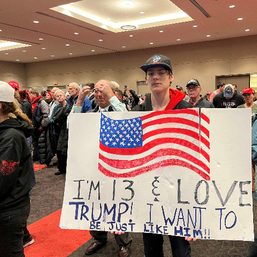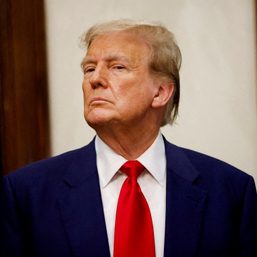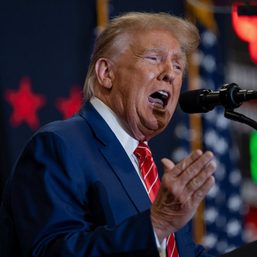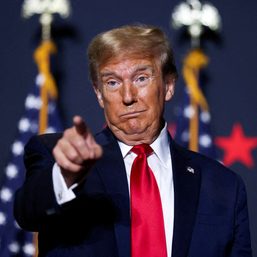SUMMARY
This is AI generated summarization, which may have errors. For context, always refer to the full article.
![[OPINION] The rise and fall of Donald Trump](https://www.rappler.com/tachyon/2020/11/riseanddownfall-of-trump-640.jpg)
The results of the US elections showed that the incumbent president lost his bid for a second term. But the issues that brought him to the White House in 2016 remain unresolved. Seventy million Americans defied the opinion poll surveys and voted for the Republican ticket, delivered additional seats for the party in the House, and denied the Democrats the control of the Senate.
Notwithstanding Trump’s legal offensive to overturn the current electoral count, it would be difficult to invalidate the 74 million votes cast for Joseph Biden. Republican leaders and their election lawyers concede that no proof has thus far been offered to substantiate allegations of election fraud. A five-person panel election, with representation from both political parties oversee the counting of the ballots and the Party had mobilized its own army of poll watchers.
Trump supporters cannot yet process how massive leads in the battleground states evaporated and, in a few days, turned negative. But this was the pattern analysts had anticipated and which Trump had helped to shape. First, this was a COVID-19 election, when concern over contagion promoted early voting and mailed-in ballots. The Democrats encouraged voting by mail; the Republicans pushed for in-person voting, which led to their votes being counted first and giving them an early lead. Second, the Democrats learned from the 2016 elections and mobilized to get their followers to vote. An estimated 67% of the electorate turned out for the 2020 elections, the highest participation rate in 120 years.
Finally, Trump contributed heavily to his own defeat. Recall the gratuitous denigration of Arizona Republican senator John McCain, whose heroism as an unyielding Prisoner of War in Hanoi he dismissed – because he preferred to honor soldiers who did not allow themselves to be captured. This gave credibility, despite his denials, to reports that he considered those who served in the military as “losers,” for doing work that gave them little gain. He escaped the Vietnam draft himself because his doctor discovered bone spurs on his foot. He was not invited to the senator’s funeral services and the widow, Cindy McCain, eventually endorsed the Biden candidacy. One wonders how many votes Trump lost in Arizona and other states because of the McCain opposition.
But the wave that Trump rode all the way to the White House in 2016 remains strong, in part because Trump in the last 4 years continued to give it energy. Caucasian, non-college-educated, mainly rural, working class evangelical Christians who form the hard core of the Trump base had not benefitted from the emergence of the knowledge economy and global trade. The deterioration in living standards contributed to the flipping of traditional “Blue” Democrat states like Wisconsin, Michigan, and Philadelphia into Republican Red in the 2016 elections. They had seen their income rise before the pandemic and, apparently, did not blame the administration for the recession caused by COVID-19.
Their disenchantment with the Democrats, moreover, did not originate only from their economic concerns. Issues of identity politics and the culture wars, including conflicting views on gun rights, immigration, abortion, and the historical legacy of the Confederacy played as big a role. Hillary Clinton perhaps doomed her presidential bid when she carelessly dismissed Trump supporters as “deplorables” and seemed to confirm the elite’s marginalization of Middle America.
Unfortunately, Donald Trump was too flawed a vessel to contain the aspirations of the Republican party faithful. Successive shocks punctuated his four-year term: the sex scandals and lawsuits, the impeachment trial, the reemergence of racial animosities, mismanagement of the pandemic crisis leading to thousands of American deaths, disputes with traditional allies, heightened threats from strategic rivals, and damage to the international image and reputation of the United States around the world.
The unflagging support of his hardcore base enabled Trump to skate over these problems but made it difficult for him to enlarge his tent. Trump clearly was the big loser; the party, particularly the Never-Trumpers, might be considered among the winners, successfully distancing themselves from the president without surrendering too much ground to the Democrats in the elections.
Sharing his views in an interview with former Australian deputy prime minister John Anderson, Victor Davies Hanson, a Senior Fellow at the Hoover Institution, saw Trump as a “tragic hero,” depicted in cowboy movies like High Noon, Shane, and The Magnificent Seven by actors like Gary Cooper, Alan Ladd, Steve McQueen and John Wayne. They were not model citizens by any means but intervened in dangerous situations to settle problems ordinary citizens could not address. They do the job and then ride off into the sunset, without receiving commendation or thanks from the people they had saved.
As someone, who grew up watching such movies in Manila theaters, I found Hanson’s allusion surprising. In the wild, wild West, cowboy heroes often violated the letter of the law, but always in the pursuit of a higher morality. They also often exemplified admirable virtues not prominently seen in Trump: their modesty, respect for women, sense of fairness, fidelity in honoring their word, the instinct to side with the underdog.
Can Trump make a comeback in 2024? Hanson noted that Trump then would only be 78 years old, Biden’s age now. Hence, age may not be an issue, if 82-year-old Biden decides to go for a second term. But a Trump return seems improbable, much depending on the legal and financial problems he will face after he loses presidential immunity from prosecution.
And a return would deviate from the character of Hanson’s quintessential cowboy hero. The gunfighter riding off into the sunset does not reverse course. Shane does not come back. – Rappler.com
Edilberto C. de Jesus is professor emeritus at the Asian Institute of Management.
Add a comment
How does this make you feel?





There are no comments yet. Add your comment to start the conversation.